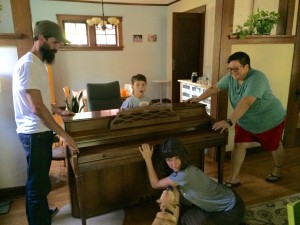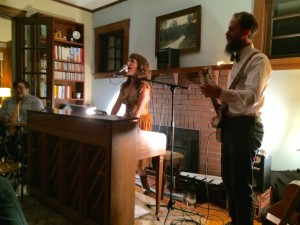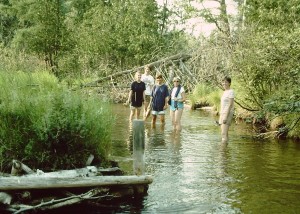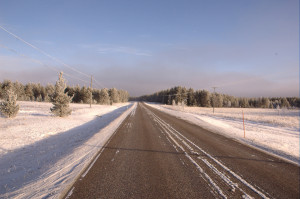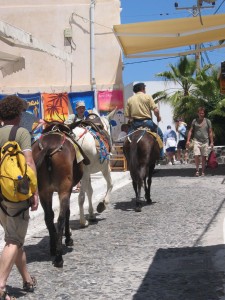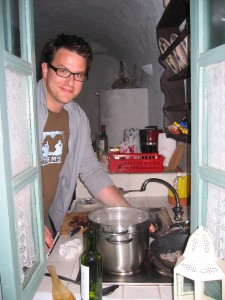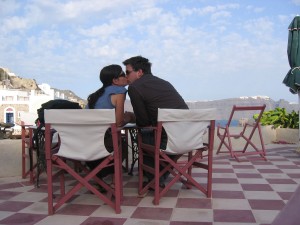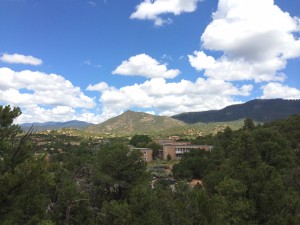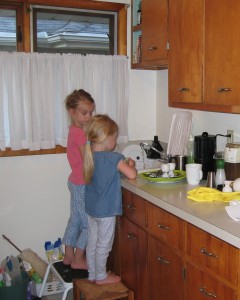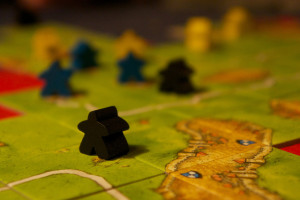Deep in sleep, I am dreaming of feasts.
I’m dreaming of a long table set for many, holding platters piled high with meat, the rich juices pooling below.
In my dream there is plenty—not just plenty of food, but plenty of everything that we crave: plenty of room, plenty of laughter and conversation, and, perhaps most of all, plenty of time. We are all around the table, feasting together, taking our time. There’s nowhere we need to be, no agenda beyond savoring the food and one another.
As I settle into a contented, even deeper sleep, my mouth salivates, and it seems my soul is anticipating the meal every bit as much as my taste buds.
* * * * *
When I wake up the next morning, the dream is still vivid—probably because the scent of slow-roasting pork shoulder is real. It fills the house, blurring the lines between my worlds of dreaming and waking.
Yesterday, my husband Jason came home for lunch just so he could unwrap the pork shoulder and prepare a rub. Rosemary, sage, garlic, fennel seed, salt, pepper, white wine, and olive oil became a rustic paste with the help of his mortar and pestle. As he applied the rub, Jason handled the meat lovingly, like a newborn getting its first bath.
 Jason’s respect for the piece of meat in his hands runs deep; it’s rooted not only in his knowledge of the flavor the meat is capable of producing—how the layers of collagen and marbled fat will soften and melt into the meat as it spends time in the oven—but also in his friendship with the farmer who raises the pigs and cattle we eat. Jason and Stan could talk about meat for hours, it seems. Could a cook’s ability to talk at length about meat be a direct measure of his ability to magically transform it into something that demands a response? It seems entirely possible.
Jason’s respect for the piece of meat in his hands runs deep; it’s rooted not only in his knowledge of the flavor the meat is capable of producing—how the layers of collagen and marbled fat will soften and melt into the meat as it spends time in the oven—but also in his friendship with the farmer who raises the pigs and cattle we eat. Jason and Stan could talk about meat for hours, it seems. Could a cook’s ability to talk at length about meat be a direct measure of his ability to magically transform it into something that demands a response? It seems entirely possible.
After bathing the pork shoulder in the redolent rub, Jason returned it to the refrigerator for the important resting period that allows the flavors to penetrate and soften the meat. Then he hung his apron back on its hook, gave me a kiss, and headed back to work.
* * * * *
I spent the afternoon writing in my home office, for the most part forgetting about the resting pork until I went to make tea in the kitchen, where I smelled the remnants of crushed rosemary and sage still in the stone mortar on the counter.
A love for cooking is something Jason and I share. But Jason’s willingness to embrace a process—to cook something that involves multiple steps and often multiple days—is something I don’t find appealing. I’m too impatient, too eager to find out what a particular mix of ingredients tastes like in my mouth. I also don’t understand (or, I suppose, care to understand) the science behind cooking—what happens when meat is seared, fat is rendered, onions are caramelized, steaks are tented under foil after coming off the grill. I’m all about the results; the taste alone tells me all I need to know about the science.
But to be married to someone with that level of curiosity, patience, and knowledge about the many complexities of food? That is a gift I willingly receive. I’ll lend support with the sides and dessert, the texts to friends asking if they’re free for dinner, and the carefully set table. Perhaps my favorite thing about pork shoulder, after all, is the imperative that accompanies it: The 10-pound shoulder demands that we invite friends for a feast.
* * * * *
Later that night, while I was washing my face before bed, I heard Jason downstairs in the kitchen—the beeping of the oven being set at 225, and the clatter of the roast pan being pulled from the cabinet. Finally, the well-rested and seasoned pork shoulder was tucked into the oven and the kitchen lights were turned off.
As we settled into bed, the only scents that reached my nose were soap and toothpaste, and a whiff of detergent on the fresh tank top I’d pulled on with my pajama pants. Falling asleep, we had only the knowledge of what was taking place in the oven downstairs, none of the proof.
* * * * *
Around 3:00 am, though, our noses are roused by the rich scent of roasting meat, as the juices begin to drip, soaking the rosemary that has fallen to the bottom of the pan. The scent tickles our minds and pokes gently at our stomachs as the other parts of our bodies continue on in sleep.
And the dreams that are triggered? They’re the very best kind: dreams of full tables and bellies, friendship and fellowship, and a meal that invites us to sit and savor, as if we have all the time in the world.
* * * * *
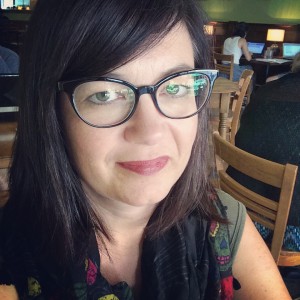 “Dreaming of Feasts” is by Kristin Tennant. Kristin and her husband and two teenage daughters are settled in a small, Midwestern university town edged by cornfields. Her days in Urbana are filled with freelance writing in her sunroom office or favorite coffee shop, learning (mostly by doing) everything she can about parenting teens, cooking elaborate feasts with her husband Jason, and feeding as many people as possible in their big old home. (The photo above shows Jason with the porchetta he made during a family vacation this past summer.)
“Dreaming of Feasts” is by Kristin Tennant. Kristin and her husband and two teenage daughters are settled in a small, Midwestern university town edged by cornfields. Her days in Urbana are filled with freelance writing in her sunroom office or favorite coffee shop, learning (mostly by doing) everything she can about parenting teens, cooking elaborate feasts with her husband Jason, and feeding as many people as possible in their big old home. (The photo above shows Jason with the porchetta he made during a family vacation this past summer.)

